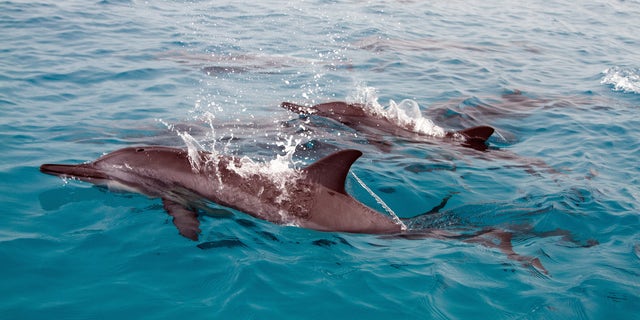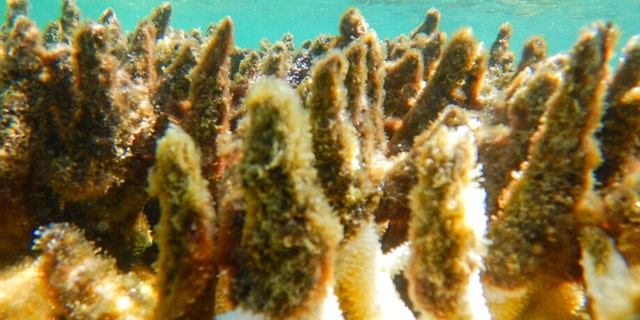NEWYou can now listen to Fox News articles!
Some dolphins treat skin conditions by rubbing themselves against corals, according to a recent report in the journal iScience.
Researchers said in the report that the corals have medicinal properties and suggested that the dolphins use the marine invertebrates to medicate skin conditions.

Dolphins were observed rubbing against specific corals.
Co-lead author Angela Ziltener, who is also a wildlife biologist at the University of Zurich in Switzerland, said in a news release that she noticed that dolphins in the Northern Red Sea off the coast of Egypt were selective about which corals they rubbed against.
“I hadn’t seen this coral rubbing behavior described before, and it was clear that the dolphins knew exactly which coral they wanted to use,” Ziltener said in the release and added, “I thought, ‘There must be a reason.”

Spinner dolphins swim in a pod.
(Sylvain CORDIER/Gamma-Rapho via Getty Images)
OVER 90% OF GREAT BARRIER REEF CORAL STUDIED THIS YEAR WAS BLEACHED
After gaining the trust of the group of dolphins, Ziltener and her team identified and took samples of the corals that the dolphins chose to rub against. The researchers said that when the Indo-Pacific bottlenose dolphins repeatedly rubbed against the coral, the tiny polyps that that make up the coral released mucus. The team collected and analyzed samples of the mucus.
Lead author Gertrud Morlock, who is an analytical chemist and food scientist at Justus Liebig University Giessen in Germany, looked at the samples of the gorgonian coral Rumphella aggregata, the leather coral Sarcophyton sp., and the sponge Ircinia sp. The researchers said in the release that they found 17 active metabolites with antibacterial, antioxidative, hormonal, and toxic activities. The study authors suggested the mucus played a role in regulating the dolphin’s skin microbiome and treating infections.
“Repeated rubbing allows the active metabolites to come into contact with the skin of the dolphins,” Morlock said in the release. “These metabolites could help them achieve skin homeostasis and be useful for prophylaxis or auxiliary treatment against microbial infections.”

New research says dolphins “talk” to each other like humans. This file photo shows Tapeko, a 31-year-old bottlenose dolphin, and her 8-week-old calf at Brookfield Zoo in Brookfield, Ill.
(AP Photo/Chicago Zoological Society, Jim Schulz)
Ziltener added that the reefs served as bedrooms and playgrounds for the dolphins and after a nap, the dolphins would typically perform the coral rubbing behavior. “It’s almost like they are showering, cleaning themselves before they go to sleep or get up for the day,” Zieltener said in the release.
The benefits of coral in human health are being studied. The National Oceanic and Atmospheric Administration, NOAA, said on its website, “many drugs are being developed from coral reef animals and plants as possible cures for cancer, arthritis, human bacterial infections, viruses and other diseases.”
2 SPERM WHALES DIE WITHIN WEEK IN FLORIDA KEYS
While Ziltener’s group suggests that coral may have a medicinal effect on dolphin’s skin, some studies described an adverse condition called coral dermatitis that may occur in humans when they touch coral. One study said that corals “are known to produce a toxic substance which when comes in to contact with human skin may elicit hypersensitive reactions.”

This photo supplied by the Great Barrier Reef Marine Park Authority (GBRMPA) shows diseased corals at a reef in the Cairns/Cooktown on the Great Barrier Reef in Australia.
((N. Mattocks/GBRMPA via AP))
Some marine biologists and animal experts told FOX News that the study is interesting however, more research is needed in this area. They also noted that they worry a study like this would attract more people to the coral reefs, endangering the reef’s existence.
CLICK HERE TO GET THE FOX NEWS APP
The scientists said in the study that coral reefs are severely threatened by damage caused by tourists, water pollution, disease, and habitat destruction.